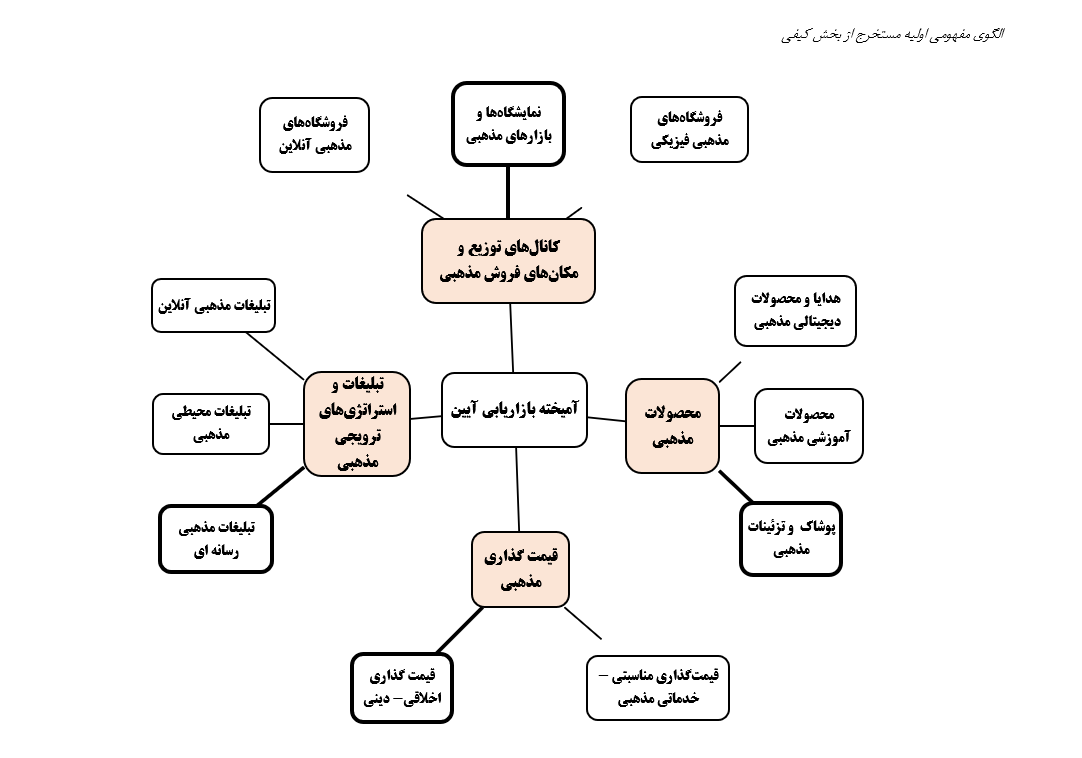Designing a Ritual Marketing Mix Model Using Thematic Analysis
Keywords:
Marketing, ritual marketing, religion, mixed ritual marketingAbstract
The aim of this study is to design a ritual marketing mix model. This research, with a qualitative approach and applied goals, was conducted using thematic analysis. The experts included faculty members and senior managers, and the interviewees were 15 individuals who were selected through purposive sampling until theoretical saturation was reached. Data were collected using semi-structured interviews. To ensure validity and reliability, the findings were confirmed by the interviewees. For data analysis, the method by Braun and Clarke was employed with MAXQDA software. The findings from the interview analysis revealed one overarching theme, four organized themes, eleven basic themes, and 63 initial codes for designing the model. The results showed that the ritual marketing mix enables religious organizations and institutions to present their religious programs and services more effectively and respond to the needs and desires of the religious community. By considering various elements of the marketing mix and adapting them to the specific characteristics of religious environments, the quality and effectiveness of religious activities can be improved. In this way, religious marketing can play an important role in enhancing and expanding religious activities and increasing the participation of community members.
Downloads
References
Abraham, J. E., & Simatupang, P. (2023). Rapid Deployment and Operation of Faith-Based Digital Social Innovation. Asian
Journal of Management, Entrepreneurship and Social Science, 3(01), 382-404.
https://ajmesc.com/index.php/ajmesc/article/view/268
Agheli, M., NikMenesh, S., Rashidi, H., & Jalali, P. (2023). Training on Thesis Writing and Scientific Article Writing.
Dibagaran Book Institute.
Al Jabouri, A. A. N., & Al-Yasiri, N. H. (2022). Marketing religious tolerance and its role in peaceful coexistence between
religions and its impact on the local economy is an applied study in Iraq. Ishtar Journal of Economics and Business Studies
(IJEBS), 3(1), 1-14.
nce_between_religions_and_its_impact_on_the_local_economy_is_an_applied_study_in_Iraq
Altay, B. C., Okumuş, A., & Adıgüzel Mercangöz, B. (2022). An intelligent approach for analyzing the impacts of the COVID19 pandemic on marketing mix elements (7Ps) of the on-demand grocery delivery service. Complex & Intelligent Systems,
(1), 129-140. https://doi.org/10.1007/s40747-021-00358-1
Amirhesari, S., Amari, H., Gharabaghlou, H., & Boudaghi, H. (2022). Altruistic Leadership in Islamic Business: Development
of a New Cultural Scale. Applied Educational Leadership, 3(2), 49-64. https://ael.uma.ac.ir/article_1773.html?lang=en
Barzegar, E., & Raji, M. H. (2021). Political Marketing and the Threefold Model of Islamic Political Thought. Contemporary
Political Essays, 12(3), 1-28. https://politicalstudy.ihcs.ac.ir/article_6064.html?lang=en
Block, J., Fisch, C., & Rehan, F. (2020). Religion and entrepreneurship: a map of the field and a bibliometric analysis.
Management Review Quarterly, 70, 591-627. https://doi.org/10.1007/s11301-019-00177-2
Braun, V., & Clarke, V. (2006). Using thematic analysis in psychology. Qualitative research in psychology, 3(2), 77-101.
https://doi.org/10.1191/1478088706qp063oa
Derafshan, S. A., Khalil Javaheri, S. M. M., & Hamdallah, N. (2021). Marketing and the Use of Modern Communication
Technology Tools in the Islamic Economy. Second National Conference on Drivers and Threats Facing the Islamic
Revolution in Its Second Step,
Dobocan, F. C. (2015). Religious Marketing a means of satisfying parishioners needs and determining their loyalty. Journal
for the Study of Religions and Ideologies, 14(40), 112-130.
https://www.researchgate.net/publication/279322868_Religious_marketing_-
a_means_of_satisfying_parishioners%27needs_and_determining_their_loyalty
Esfahaniyan, M., & Sharaf al-Din, S. H. (2022). Investigating the Challenges of Religious Propagation Based on the Nature of
Religious Marketing. Islam and Social Sciences Scientific-Research Quarterly.
https://soci.rihu.ac.ir/article_2059.html?lang=en
Floren, J., Rasul, T., & Gani, A. (2020). Islamic marketing and consumer behaviour: a systematic literature review. Journal of
Islamic Marketing, 11(6), 1557-1578. https://doi.org/10.1108/JIMA-05-2019-0100
Hatami-Nasab, S. H. (2022). Mapping Islamic Marketing in Iranian Businesses. Business Studies, 20(112), 81-102.
https://barresybazargani.itsr.ir/article_247038.html?lang=en
Kumar, S., Sahoo, S., Lim, W. M., & Dana, L. P. (2022). Religion as a social shaping force in entrepreneurship and business:
Insights from a technology-empowered systematic literature review. Technological Forecasting and Social Change, 175,
https://doi.org/10.1016/j.techfore.2021.121393
Nourbakhsh, F., & Abbasi, R. (2021). A Critique of Commercial Messages on National Media from the Perspective of Islamic
Marketing. Cultural Strategy Scientific-Research Quarterly, 14(55), 161-190.
Preda, A. (2019). How faith-based marketing can forestall the crisis of institutionalized religion. Journal for the Study of
Religions and Ideologies, 18(52), 125-141. http://jsri.ro/ojs/index.php/jsri/article/view/1043
Rezaei, H. (2020). Examining the Acceptance of Religious Propagation in Religious Societies Using Marketing Tools. Strategic
Management Thinking (Management Thought), 14(1), 81-100. https://smt.isu.ac.ir/article_75436.html?lang=en
Shakibaee-Fard, E., Jamshidian, L., & Torkfar, A. (2020). A Framework for Developing Islamic Marketing in Iran's Sports
Sector. Sport Management Studies, 12(63), 261-280. https://smrj.ssrc.ac.ir/article_2016.html
Stolz, J., & Usunier, J. C. (2019). Religions as brands? Religion and spirituality in consumer society. Journal of Management,
Spirituality & Religion, 16(1), 6-31. https://doi.org/10.1080/14766086.2018.1445008
Trzeszczyńska, P., Pędziwiatr, K., & Wiktor-Mach, D. (2023). Between needs, goods and services: Ukrainian immigrants on
the Polish religious market. Social Compass, 70(1), 149-165. https://doi.org/10.1177/00377686231158556
Wang, L., & Wong, P. P. W. (2020). Marketing of environmentally friendly hotels in China through religious segmentation: a
theory of planned behaviour approach. Tourism Review, 76(5), 1164-1180. https://doi.org/10.1108/TR-08-2019-0327

Downloads
Published
Submitted
Revised
Accepted
Issue
Section
License
Copyright (c) 2024 Journal of Technology in Entrepreneurship and Strategic Management (JTESM)

This work is licensed under a Creative Commons Attribution-NonCommercial 4.0 International License.










